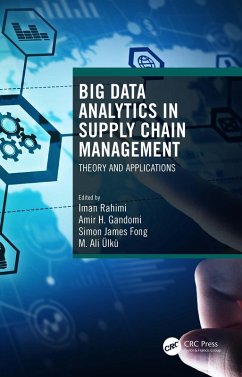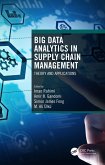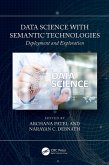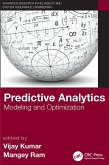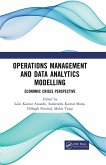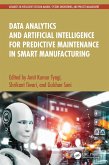Big Data Analytics in Supply Chain Management (eBook, PDF)
Theory and Applications
Redaktion: Rahimi, Iman; Ülkü, M. Ali; Fong, Simon James; Gandomi, Amir H.
49,95 €
49,95 €
inkl. MwSt.
Sofort per Download lieferbar

25 °P sammeln
49,95 €
Als Download kaufen

49,95 €
inkl. MwSt.
Sofort per Download lieferbar

25 °P sammeln
Jetzt verschenken
Alle Infos zum eBook verschenken
49,95 €
inkl. MwSt.
Sofort per Download lieferbar
Alle Infos zum eBook verschenken

25 °P sammeln
Big Data Analytics in Supply Chain Management (eBook, PDF)
Theory and Applications
Redaktion: Rahimi, Iman; Ülkü, M. Ali; Fong, Simon James; Gandomi, Amir H.
- Format: PDF
- Merkliste
- Auf die Merkliste
- Bewerten Bewerten
- Teilen
- Produkt teilen
- Produkterinnerung
- Produkterinnerung

Bitte loggen Sie sich zunächst in Ihr Kundenkonto ein oder registrieren Sie sich bei
bücher.de, um das eBook-Abo tolino select nutzen zu können.
Hier können Sie sich einloggen
Hier können Sie sich einloggen
Sie sind bereits eingeloggt. Klicken Sie auf 2. tolino select Abo, um fortzufahren.

Bitte loggen Sie sich zunächst in Ihr Kundenkonto ein oder registrieren Sie sich bei bücher.de, um das eBook-Abo tolino select nutzen zu können.
This book discusses the results of a recent large-scale achievement on Big Data Analytics (BDA) topics among Supply Chain Management (SCM) professionals The book intends to show a diversity of supply chain management issues that may benefit from BDA, both in theory and practice.
- Geräte: PC
- mit Kopierschutz
- eBook Hilfe
Andere Kunden interessierten sich auch für
![Big Data Analytics in Supply Chain Management (eBook, ePUB) Big Data Analytics in Supply Chain Management (eBook, ePUB)]() Big Data Analytics in Supply Chain Management (eBook, ePUB)49,95 €
Big Data Analytics in Supply Chain Management (eBook, ePUB)49,95 €![Data Science with Semantic Technologies (eBook, PDF) Data Science with Semantic Technologies (eBook, PDF)]() Data Science with Semantic Technologies (eBook, PDF)65,95 €
Data Science with Semantic Technologies (eBook, PDF)65,95 €![Predictive Analytics (eBook, PDF) Predictive Analytics (eBook, PDF)]() Predictive Analytics (eBook, PDF)47,95 €
Predictive Analytics (eBook, PDF)47,95 €![Operations Management and Data Analytics Modelling (eBook, PDF) Operations Management and Data Analytics Modelling (eBook, PDF)]() Operations Management and Data Analytics Modelling (eBook, PDF)48,95 €
Operations Management and Data Analytics Modelling (eBook, PDF)48,95 €![Engineering Mathematics and Artificial Intelligence (eBook, PDF) Engineering Mathematics and Artificial Intelligence (eBook, PDF)]() Engineering Mathematics and Artificial Intelligence (eBook, PDF)65,95 €
Engineering Mathematics and Artificial Intelligence (eBook, PDF)65,95 €![Monte-Carlo Simulation (eBook, PDF) Monte-Carlo Simulation (eBook, PDF)]() Alan StevensMonte-Carlo Simulation (eBook, PDF)48,95 €
Alan StevensMonte-Carlo Simulation (eBook, PDF)48,95 €![Data Analytics and Artificial Intelligence for Predictive Maintenance in Smart Manufacturing (eBook, PDF) Data Analytics and Artificial Intelligence for Predictive Maintenance in Smart Manufacturing (eBook, PDF)]() Data Analytics and Artificial Intelligence for Predictive Maintenance in Smart Manufacturing (eBook, PDF)52,95 €
Data Analytics and Artificial Intelligence for Predictive Maintenance in Smart Manufacturing (eBook, PDF)52,95 €-
-
-
This book discusses the results of a recent large-scale achievement on Big Data Analytics (BDA) topics among Supply Chain Management (SCM) professionals The book intends to show a diversity of supply chain management issues that may benefit from BDA, both in theory and practice.
Dieser Download kann aus rechtlichen Gründen nur mit Rechnungsadresse in A, B, BG, CY, CZ, D, DK, EW, E, FIN, F, GR, HR, H, IRL, I, LT, L, LR, M, NL, PL, P, R, S, SLO, SK ausgeliefert werden.
Produktdetails
- Produktdetails
- Verlag: Taylor & Francis eBooks
- Seitenzahl: 210
- Erscheinungstermin: 20. Dezember 2020
- Englisch
- ISBN-13: 9781000326918
- Artikelnr.: 60575946
- Verlag: Taylor & Francis eBooks
- Seitenzahl: 210
- Erscheinungstermin: 20. Dezember 2020
- Englisch
- ISBN-13: 9781000326918
- Artikelnr.: 60575946
- Herstellerkennzeichnung Die Herstellerinformationen sind derzeit nicht verfügbar.
Iman Rahimi, B.Sc. (Applied Mathematics), M.Sc. (Applied Mathematics - Operations Research) earned his PhD in the Department of Mechanical and Manufacturing Engineering, Faculty of Engineering, Universiti Putra Malaysia, Malaysia in 2017. He is now a research scholar at the Faculty of Engineering &Information Technology, University of Technology Sydney, Australia. His research interests include machine learning, optimization, and supply chain management. He has edited a book entitled: "Evolutionary Computation in Scheduling" with Wiley. He has acted as an editor for journals of: "Computational Research Progress in Applied Science & Engineering (CRPASE)", "International Journal Renewable Energy Technology (IJRET)", and "International Journal of Advanced Heuristic and Meta-Heuristic Algorithms". Also, Iman has acted as an editor and co-editor of the books for some prestige publishers ("Elsevier and Taylor & Francis"). Amir H. Gandomi is a Professor of Data Science at the Faculty of Engineering & Information Technology, University of Technology Sydney. Prior to joining UTS, Prof. Gandomi was an Assistant Professor at the School of Business, Stevens Institute of Technology, USA and a distinguished research fellow in BEACON center, Michigan State University, USA. Prof. Gandomi has published over one hundred and eighty journal papers and seven books which collectively have been cited more than 16,000 times (H-index = 58). He has been named as one of the most influential scientific mind and Highly Cited Researcher (top 1%) for three consecutive years, 2017 to 2019. He also ranked 18th in GP bibliography among more than 12,000 researchers. He has served as associate editor, editor and guest editor in several prestigious journals such as AE of SWEVO, IEEE TBD, and IEEE IoTJ. Prof Gandomi is active in delivering keynotes and invited talks. His research interests are global optimisation and (big) data analytics using machine learning and evolutionary computations in particular. Simon Fong graduated from La Trobe University, Australia, with a 1st Class Honours BEng. Computer Systems degree and a PhD. Computer Science degree in 1993 and 1998 respectively. Simon is now working as an Associate Professor at the Computer and Information Science Department of the University of Macau. He is a co-founder of the Data Analytics and Collaborative Computing Research Group in the Faculty of Science and Technology. Prior to his academic career, Simon took up various managerial and technical posts, such as systems engineer, IT consultant and e-commerce director in Australia and Asia. Dr. Fong has published over 500 international conference and peer-reviewed journal papers, mostly in the areas of data mining, data stream mining, big data analytics, meta-heuristics optimization algorithms, and their applications. He serves on the editorial boards of the Journal of Network and Computer Applications of Elsevier, IEEE IT Professional Magazine, and various special issues of SCIE-indexed journals. Simon is also an active researcher with leading positions such as Vice-chair of IEEE Computational Intelligence Society (CIS) Task Force on "Business Intelligence & Knowledge Management", and Vice-director of International Consortium for Optimization and Modelling in Science and Industry (iCOMSI). M. Ali Ülkü, Ph.D., is a Full Professor of Supply Chain and Decision Sciences, and the Director of the Centre for Research in Sustainable Supply Chain Analytics-CRSSCA, in the Rowe School of Business at Dalhousie University, Halifax, NS, Canada. Dr. Ülkü is also cross appointed with the Department of Industrial Engineering, and the School for Resource and Environmental Studies. He received his Ph.D. in Management Sciences from the University of Waterloo, M.Sc. in Operations Research from Çukurova University, and B.Sc. in Industrial Engineering from Bilkent University. Prior to his academic career, he worked as a productivity consultant in the largest international brewery in Turkey. Dr. Ülkü's research thrusts include the theoretical modeling of sustainable supply chain and logistics systems, operations-marketing interface, and mathematical modeling of consumer behaviour and societal problems. He published in such journals as Annals of Operations Research, European Journal of Operational Research, International Journal of Production Economics, Journal of Business Research, Journal of Cleaner Production, and Service Science. His research funding includes those from The Natural Sciences and Engineering Research Council of Canada, The Scientific and Technological Research Council of Turkey, and The United States National Science Foundation. A recipient of the Exceptional Teaching Award from the University of Waterloo, Dr. Ülkü has taught operations management, business analytics, logistics, and supply chain management courses at various universities in Canada, Turkey, and the USA. He served as the Program Chair for the 2018 Canadian Operational Research Society Conference. The IEOM Society International honoured him with the 2019 Distinguished Professor Award.
Chapter 1. Big Data Analytics in Supply Chain Management: A Scientometric
Analysis
Chapter 2. Supply Chain Analytics Technology for Big Data
Chapter 3. Prioritizing the Barriers and Challenges of Big Data Analytics
in Logistics and Supply Chain Management Using MCDM Method
Chapter 4. Big Data in Procurement 4.0: Critical Success Factors and
Solutions
Chapter 5. Recommendation Model based on Expiry Date of Product Using Big
Data Analytics
Chapter 6. Comparing Company's Performance To Its Peers: A Data Envelopment
Approach
Chapter 7. Sustainability, Big Data, and Consumer Behavior: A Supply Chain
Framework
Chapter 8. A Soft Computing Techniques Application of An Inventory Model in
Solving Two-Warehouses Using Cuckoo Search Algorithm
Chapter 9. An Overview of the Internet of Things Technologies Focuses on
Disaster Response
Chapter 10. Closing the Big Data Talent Gap
Analysis
Chapter 2. Supply Chain Analytics Technology for Big Data
Chapter 3. Prioritizing the Barriers and Challenges of Big Data Analytics
in Logistics and Supply Chain Management Using MCDM Method
Chapter 4. Big Data in Procurement 4.0: Critical Success Factors and
Solutions
Chapter 5. Recommendation Model based on Expiry Date of Product Using Big
Data Analytics
Chapter 6. Comparing Company's Performance To Its Peers: A Data Envelopment
Approach
Chapter 7. Sustainability, Big Data, and Consumer Behavior: A Supply Chain
Framework
Chapter 8. A Soft Computing Techniques Application of An Inventory Model in
Solving Two-Warehouses Using Cuckoo Search Algorithm
Chapter 9. An Overview of the Internet of Things Technologies Focuses on
Disaster Response
Chapter 10. Closing the Big Data Talent Gap
Chapter 1. Big Data Analytics in Supply Chain Management: A Scientometric
Analysis
Chapter 2. Supply Chain Analytics Technology for Big Data
Chapter 3. Prioritizing the Barriers and Challenges of Big Data Analytics
in Logistics and Supply Chain Management Using MCDM Method
Chapter 4. Big Data in Procurement 4.0: Critical Success Factors and
Solutions
Chapter 5. Recommendation Model based on Expiry Date of Product Using Big
Data Analytics
Chapter 6. Comparing Company's Performance To Its Peers: A Data Envelopment
Approach
Chapter 7. Sustainability, Big Data, and Consumer Behavior: A Supply Chain
Framework
Chapter 8. A Soft Computing Techniques Application of An Inventory Model in
Solving Two-Warehouses Using Cuckoo Search Algorithm
Chapter 9. An Overview of the Internet of Things Technologies Focuses on
Disaster Response
Chapter 10. Closing the Big Data Talent Gap
Analysis
Chapter 2. Supply Chain Analytics Technology for Big Data
Chapter 3. Prioritizing the Barriers and Challenges of Big Data Analytics
in Logistics and Supply Chain Management Using MCDM Method
Chapter 4. Big Data in Procurement 4.0: Critical Success Factors and
Solutions
Chapter 5. Recommendation Model based on Expiry Date of Product Using Big
Data Analytics
Chapter 6. Comparing Company's Performance To Its Peers: A Data Envelopment
Approach
Chapter 7. Sustainability, Big Data, and Consumer Behavior: A Supply Chain
Framework
Chapter 8. A Soft Computing Techniques Application of An Inventory Model in
Solving Two-Warehouses Using Cuckoo Search Algorithm
Chapter 9. An Overview of the Internet of Things Technologies Focuses on
Disaster Response
Chapter 10. Closing the Big Data Talent Gap
